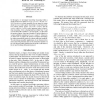Free Online Productivity Tools
i2Speak
i2Symbol
i2OCR
iTex2Img
iWeb2Print
iWeb2Shot
i2Type
iPdf2Split
iPdf2Merge
i2Bopomofo
i2Arabic
i2Style
i2Image
i2PDF
iLatex2Rtf
Sci2ools
135
click to vote
KR
2004
Springer
2004
Springer
Reasoning about Knowledge by Variable Forgetting
In this paper, we investigate knowledge reasoning within a simple framework called knowledge structure. We use variable forgetting as a basic operation for one agent to reason about its own or other agents’ knowledge. In our framework, two notions namely agents’ observable variables and the weakest sufficient condition play important roles in knowledge reasoning. Given a background knowledge base T and a set of observable variables Oi for each agent i, we show that the notion of agent i knowing a formula ϕ can be defined as a weakest sufficient condition of ϕ on Oi under T. Moreover, we show how to capture the notion of common knowledge by using a generalized notion of weakest sufficient condition. We also discuss possible applications of our framework in some interesting domains such as the automated analysis of the well-known muddy children puzzle and the verification of the revised Needham-Schroeder protocol.
Artificial Intelligence | Knowledge Reasoning | KR 2004 | Observable Variables | Weakest Sufficient Condition |
Related Content
| Added | 02 Jul 2010 |
| Updated | 02 Jul 2010 |
| Type | Conference |
| Year | 2004 |
| Where | KR |
| Authors | Kaile Su, Guanfeng Lv, Yan Zhang |
Comments (0)

